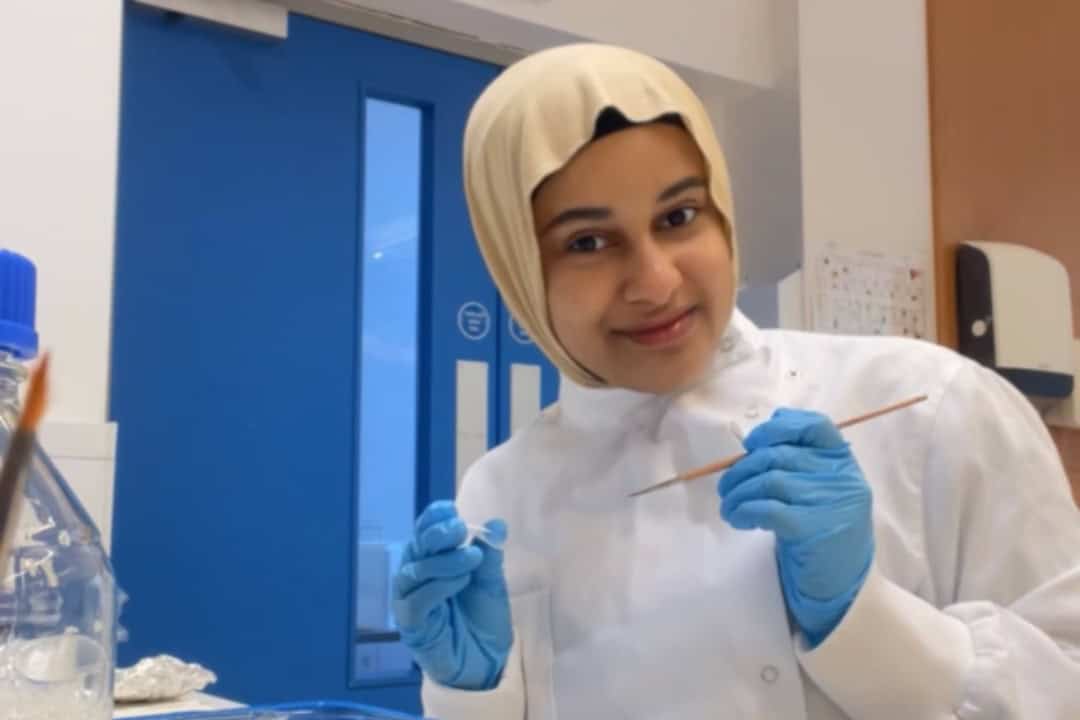
This summer, in partnership with In2scienceUK, we funded placements through the In2research programme, which gave four students the opportunity to gain practical experience in labs, and working with researchers.
Our partner In2scienceUK, is a charity working to enhance access to postgraduate research degrees and career opportunities for people from low socio-economic backgrounds and under-represented groups.
We recently caught up with Faadia Mohsin to find out how they got on during their placement…
Faadia, can you tell us about your placement and what you took away from the experience?
I was placed in Professor Jennifer Bizley’s lab and worked very closely with Dr Bhavisha Parmar at the UCL Ear Institute. The aim of my project was to collect data in a listening task from hearing participants with clinically normal levels.
I assessed whether a simulation of a noisy environment run on an iPad accurately replicated a real-life environment in terms of separating where different sounds were coming from.
To do this, I had to use an anechoic chamber (a room that is specially constructed to prevent echoes or reverberations of sound). I was investigating whether the iPad simulation was accurate enough to be used in the clinic as a measure of someone’s ability to locate where sounds are coming from (known as spatial localisation).
Currently, pure-tone hearing tests (a standard hearing test that measures the quietest sounds you can hear at different frequencies) are universally used in clinical settings, but these may not accurately measure hearing ability, especially when compared to busy environments where sounds overlap.
The iPad simulation test mimics these busy scenarios, and shares word cues simultaneously, to better test the hearing sensitivity of participants.
I really enjoyed the variety of research that takes place in the lab, from cellular studies looking at nerve cells to behavioural studies (such as listening tasks).
Every week there would be a meeting where the lab members would share updates on what they were doing and have discussions related to their projects.
From this I learnt the importance of collaboration in research and how helpful discussions can be to bounce ideas and overcome challenges.
Overall, this opportunity meant I had exposure to diverse areas of hearing research.
What did you learn about hearing loss and hearing research that you didn’t know before?
I had minimal exposure to hearing loss and research before this experience – I knew more about eyes as that is more clinically advertised – but I learnt how hearing tests are conducted in clinical settings. I also had to perform these tests on participants to make sure they were eligible to take part in my study.
This was my first experience of a hearing test and from it I learnt about the different frequencies and their associated sounds, as well as the ranges (in dB) of normal/abnormal hearing.
I have also learnt about sound localisation (how people locate where a sound is coming from) and how children with bilateral cochlear implants (a cochlear implant in both ears) find it hard to distinguish speech in noise.
The Both Ears (BEARs) clinical trial aims to improve this ability for children with cochlear implants using virtual reality games, and the pilot research I conducted with Dr. Bhavisha Parmer will help validate whether the iPad task would be a suitable measure of improvement for clinical use.
I also learnt that hearing is very broad and can be measured in a variety of ways. For instance, in people, we can use EEGs (a measure of the electrical activity of the brain) as the ear sends signals to the brain using electrical transmission.
We can also use eye-tracking to investigate how people use visual information to help them hear better.
What did you enjoy most about your placement?
Being an In2research participant at UCL Ear Institute and conducting this project has given me opportunities I didn’t know I would get.
Professor Jennifer Bizley kindly invited me along to the Auditory Science Meeting 2024 at Cambridge University where I had the pleasure of hearing talks from esteemed researchers in the field and network.
It was my first experience at a conference, and it raised the bar high!
Secondly, as I worked under Dr Bhavisha Parmer and collected data, a poster abstract was submitted for the conference, and I was third author.
To accomplish this over the summer after recently graduating with a BSc in neuroscience (2024), was truly exciting. I want to thank both my supervisors and RNID for making this possible.
Do you have any personal connection to hearing loss or tinnitus?
A close friend of mine suffers from chronic tinnitus, which has resulted in sleep disturbances and associated stress and worries.
Knowing the impact this has on the quality of her day and energy levels has made me realise how important hearing research is.
I want to see researchers tackling cases like this so that we can understand the potential causes and find possible treatments.
What else motivated you to take part in this placement?
I developed a keen interest in postgraduate study thanks to my lab project during the second year of my neuroscience undergrad.
I wanted to delve deeper into the different areas and sectors within neuroscience, so began my active search for placements. That’s when I discovered In2research.
Working with participants who have lived experience is particularly motivating since I’m interested in how clinical care and research could drive innovative change and optimise healthcare, specifically in hearing research. This is a niche area that I hadn’t previously been exposed to.
What are your thoughts on continuing to work in hearing research in the future?
I would love to continue working in hearing research in the future. I am currently taking a gap year and researching placements and projects that I could apply for.
I am also considering a Masters or research assistant position before doing a PhD. I would have never considered this before having this opportunity.
Find out more about In2scienceUK.